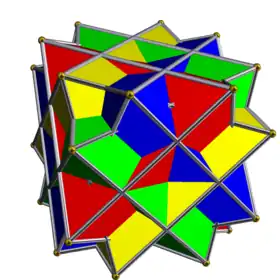| Compound of four octahedra | |
|---|---|
 | |
| Type | Uniform compound |
| Index | UC12 |
| Convex hull | Nonuniform truncated cube |
| Polyhedra | 4 octahedra |
| Faces | 8+24 triangles |
| Edges | 48 |
| Vertices | 24 |
| Symmetry group | octahedral (Oh) |
| Subgroup restricting to one constituent | 3-fold antiprismatic (D3d) |

3D model of a compound of four octahedra
The compound of four octahedra is a uniform polyhedron compound. It's composed of a symmetric arrangement of 4 octahedra, considered as triangular antiprisms. It can be constructed by superimposing four identical octahedra, and then rotating each by 60 degrees about a separate axis (that passes through the centres of two opposite octahedral faces).
Its dual is the compound of four cubes.
Cartesian coordinates
Cartesian coordinates for the vertices of this compound are all the permutations of
- (±2, ±1, ±2)
See also
References
- Skilling, John (1976), "Uniform Compounds of Uniform Polyhedra", Mathematical Proceedings of the Cambridge Philosophical Society, 79 (3): 447–457, Bibcode:1976MPCPS..79..447S, doi:10.1017/S0305004100052440, MR 0397554, S2CID 123279687.
This article is issued from Wikipedia. The text is licensed under Creative Commons - Attribution - Sharealike. Additional terms may apply for the media files.